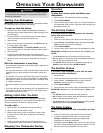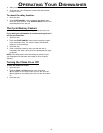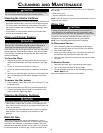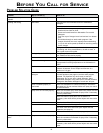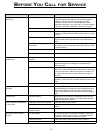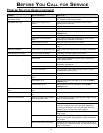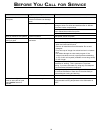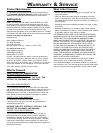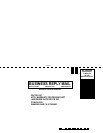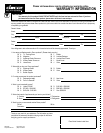
22
23
Before yoU Call for serviCe
Problem may be caused by What to do
Discoloration of stainless steel or
silver plate
Allowing salty or acidic foods to
remain on flatware can damage
them
Rinse flatware that is to stand several hours before washing.
Stainless steel contacting silver Direct contact to stainless steel can cause permanent
damage to silver. Put silver and stainless steel in different
silverware basket compartments.
Do not put stainless steel and silver flatware in the same
Clean stained items with silver polish.
Do not use abrasives on stainless steel or silver.
Marks on melamine and plastics Pourous material Use special cleaner for plastic
Cloudy film on glassware -
etching of glass
Too much detergent, especially in
soft water
Do not use bleach or scouring powder on these materials.
To remove cloudy film, try a vinegar rinse:
Wash and rinse load as usual.
Remove all metal items from dishwasher. Do not add
detergent.
Pour two cups of vinegar into a bowl and set it on bottom
rack.
Run dishes through an entire wash program. If the
vinegar rinse does not work, repeat process substituting
¼ cup of citric acid crystals (available at most drug stores)
for the vinegar.
•
•
•
•
If vinegar or citric acid rinse does not remove film, the
cloudiness is “etching”. This is permanent. To prevent
etching, if you have soft water, try using only one teaspoon
of recommended dishwasher detergent.
Use a good quality dishwasher detergent and rinse-aid. Do
not overload dishwasher. Water should circulate freely to
assure adequate rinsing and draining.
Rinse aid used with soft water Set rinse aid levels to minimum.
Sanitize button light does not
come on at the end of cycle
when Sanitize feature is
selected.
Water not hot enough Check hot water supply temperature. Minimum
recommended incoming temperature to the dishwasher is
120ºF.



